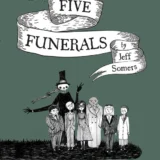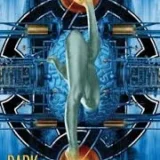
OBIR: Occasional Biased and Ignorant Reviews reflecting this reader’s opinion.

OUTSIDERS: A One-shot Anthology of Speculative Fiction
Publisher: TDotSpec Inc, Toronto, Ontario, Canada, 2020.
Editor: David F. Shultz
Cover Art: The Last Robots – by Asur Misoa
Editorial – by David F. Shultz
Premise:
The fourth in a series of anthologies of stories, each written and edited in a 24-hour period, then published “Warts and all.” Participants were members of the “Toronto Science Fiction and Fantasy Writers” and the “Toronto Dark Fiction Writers” workshops under the auspices of TDotSpec Inc. The one day event resulted in 38 stories totalling over 100,000 words.
Review:
Essentially, this implies the assembled stories are a glimpse into the reality of first drafts. I expect this means there will be flaws a’plenty. I’m anticipating each story will represent the gist of what the writer intends to say, before further reflection and judicious editing results in a story representing precisely what the author wants to say.
I’m tempted, as an editor of a magazine, to assume my reaction to each will be “Not quite a finished draft. Requires work. But a good concept so I’m willing to negotiate improvements in order to publish it.” However, I may be pleasantly surprised… or horrified.
One thing for sure, if you can write to this level, you, too, are capable of writing a first draft. In that sense these stories undoubtedly function as benchmark models for beginning writers.
FICTION:
Outside Air is No Good – by Rahul Bhagat
Premise:
The new guy in charge of the air plant in the colony on Mars decides Earth is obsolete as a role model. Time for change.
Review:
Not what I would call a realistic approach to Terraforming. Kim Stanley Robinson doesn’t need to worry. More of a broad comedy involving nepotism, wilful ignorance, and scientific misunderstanding. Could be construed as appropriate social satire reflecting contemporary trends (if you’ve been paying attention to the news).
If you accept the premise, the story will entertain you. The ending is predictable, but the fact that all the characters are enthusiastic about something they should know will spell their doom is part of the charm, their ignorance being an indictment of modern education I suppose. There’s a slight kicker to the ending but I don’t know enough to figure out if it is plausible or not. I guess that’s an indictment of my education. No matter. Not a story for science Grognards.
It’s a silly premise presented in a silly manner which amuses. We need that once in a while.
Belch – by Don Masiek
Premise:
Henrik had been camping in the winter snow of Thule with three companions. He is now the sole survivor of an attack by a monstrous wolf-like beast. Wounded, hunted, he seeks refuge in a cave.
Review:
This story comes across as a realistic, straightforward account of a fantasy/horror situation. As a result it has more credibility as a “real event” than “Outside Air is no Good.” What makes the difference, I think, is more attention to detail and the narrative being the viewpoint of the protagonist rather than that of a storyteller weaving a tale. Also, it’s much longer. Giving the writer a larger canvas, so to speak. The resulting “picture” is more complete.
“Belch” is the name Henrik gives to the little creature armed with a spear he encounters in the cave. Potential ally or just another enemy? A matter of some importance when you know a monster is following your trail of blood. Fun to see how it all works out.
Jenny, Macrog, and the Social-Work-Media Coup – by Brandon Butler
Premise:
Everyone, absolutely everyone, lives inside. But mad old Macrog lives outside in the one remaining city park. Time for Jenny to prove her worth to her bosses by enticing him to enjoy the benefits of inside living. The odd thing is, he isn’t interested.
Review:
A metaphor for artificiality in living. All about us pigeons wanting to rest happily in our slots. And the flock anger easily aroused by the individual preferring to clutch a wire wavering in the wind. For some reason we humans, no matter how content with our own community, can’t stand those who refuse to be content the same way we are. We don’t see such people as neighbours. We see them as threats, as enemies. And, of course, we must convert them to our happiness. If they prefer to be happy on their own, they must die. We’re an odd bunch, all things considered.
This story features an escalation of effort as Macrog relies on his own ingenious resources to defeat every effort to haul him inside. The resolution makes a point that is both serious and amusing, as well as thought provoking. Well done. I like it.
The Last Leviathan – by Y.M. Pang
Premise:
The humans have left for the stars, most of which have aged into red giants. The universe is old, so very old. It’s dying. Only one whale is left in the Earth’s oceans.
Review:
A sad vignette as a majestic being contemplates its fate. Normally, the last of a species doesn’t know that it is the last. It just knows that it is alone. But this creature is intelligent and remembers the songs of old. Intelligence can be a curse. So, too, memory. Yet dignity can be a blessing. And there is always hope.
The Gamble Footage – by Justin Dill
Premise:
Found footage depicting a film crew of spelunkers attempting to prove that the previous found footage showing a civilization of man-eating crabs living deep within a giant cave system was unfair to the sensibilities of crab culture.
Review:
Some readers will be reminded of the episodes devoted to “Crab People” in the cartoon Series South Park. I, being a member of the “Monster Kid Generation,” immediately harken back to the wonderful 1957 film Attack of the Crab Monsters. Going over either in your memories will immediately put you in the mood for appreciating this story.
The story is satire targeting the modern “woke” trend. Sometimes a flesh-eating giant crab IS a flesh-eating giant crab and not a mindless stereotype arrogantly applied without regard to the feelings of the victim of the stereotype. Of course, you can only go so far in that line of thought before you wind up reinforcing and justifying harmful prejudice. That’s why so much debate in this topic is a matter of preaching to the converted and radicalizing your opponents. In short, is this a story destined to arouse controversy and angry intolerance?
Well, no, it’s a story about giant, cave-dwelling, flash-eating crabs. Get a grip.
In less deft hands the crusading zeal of the expedition’s leader to prove the crabs are harmless, misunderstood creatures provoked by blundering humans might seem repetitious, but in fact her increasing fanaticism adds nicely to the growing suspense. What adds greatly to the success of the story is the true cause of the crab’s erratic behaviour comes as a total surprise. The underlying explanation for their behaviour is preposterous to the point of pushing the story into the realm of the surreal, but that’s not much of a valid complaint considering the premise it starts with.
I mean, really, the story is about irrational behaviour. The irrational ending underlines the point of the story. Let’s face it, psychologically speaking there are giant, murderous crabs lurking everywhere. I’ve met some of them myself. The story is really about us.
That said, I’m reminded of a 1953 film starring Hans Conried because, in a way, it hints at the same sort of villain come to curse our lives and culture. I won’t give the title because I don’t want to give away the ending of this story. The Monster Kid Gen knows what I’m talking about. This story makes at least as much sense as that film. Amusing, and not to be taken seriously. That way lies madness.
P.S. The movie I am referring to was based on a short story by SF writer Henry Kuttner published in 1942. I offer this as proof that even my movie references have a literary pedigree appropriate to the written works I review. So there.
Insiders Looking Out – by Wayne Cusack
Premise:
Little Maria just wants to find out what’s outside the fence that encircles their town. What she discovers is problematic for everyone she knows.
Review:
Oops! Reminded of a film (as is my wont). Namely Shyamalan’s 2004 film The Village. It was a fun movie, but the twist ending kinda sucked. Here, everything depends on the ending, because the character, an overweight girl shunned by nearly everyone (which explains why she’s not fond of the nickname “Little Maria”), discovers a so-so set-up which isn’t exactly startlingly original. Mind you, there are some nifty touches to do with doubts and disarray on the part of the “outsiders,” and overall it’s a good portrayal of the kind of rationalizations people indulge in when they want to appear rebellious and bold to their peers, yet limit their own actions and behaviour for fear of the devil they don’t know. So, a psychologically convincing tale.
The ending is a bit of surprise, but where the story truly lays claim to originality is the nature of the insiders’ reaction to the consequences of Maria’s actions. This, too, seems psychologically sound, but unexpected. The reader, on first entering the story, quickly finds the situation familiar and as quickly anticipates a predictable ending, only to discover they’re wrong. A neat trick enabling the story to stand as unique unto itself.
I do enjoy a cliché being turned upside down, or inside out. Any standard trope or theme can be reinterpreted and made new. All it takes is imagination, as this story well demonstrates.
Death Meets the Sage Who Never Dies – by Rio Murphy
Premise:
It’s taking Death a long time to find the allegedly immortal monk which is her next target. She’s tired of the search, but her curiosity keeps her going.
Review:
Actually, Death tidies up a few mortals as she gets closer and closer to her prey. Not that she sees herself as a predator. It’s just what she does. What’s truly astonishing is that none of her work is the same-old, same-old. Every “victim” sees her differently, in ways as unique as themselves, in ways that never cease to amaze. She may represent finality, yet all impose their own “take” on her handiwork. It gives her much cause to ponder. Nothing boring about her job.
Rio spent years studying Zen Buddhism. She cautions that her story is not to be taken as a literal exposition of her training, but it undoubtedly embodies the “flavour” of what she learned. My impression is that Buddhists are not cynical so much as comfortable with their beliefs. Avatars of the true nature of reality are respected for what they are, but this does not free them from criticism or disapproval. It seems Buddhists are prepared to disrupt or even ignore what they take for granted, but in the end, are resigned to what cannot be challenged. Ultimately, Death herself is meaningless. Just another milestone on the path to Karma. Or something.
I’m displaying my ignorance. But, fact is I find the story refreshing. There are many ways to face death. Might as well chose your own. The grand wheel of fate doesn’t mean you have to give up being yourself. That’s what I take from this story. Idiosyncratic to the last, I say. Could be this is the opposite of what Rio intends to convey. I don’t know. What I do know is that I come away from this story in a positive frame of mind.
Yes, I’m weird. That’s what I’m counting on to get me through life. This story reinforces my interpretation of things. Go figure.
Starship Scion – by David F. Shultz
Premise:
Damn Xenos hide themselves in the brains of humans. Now they’ve figured out a new way to infiltrate. Is it too late to save the human race?
Review:
Oh, I could throw all sorts of movies at you, starting with the 1958 film The Brain Eaters. Or I could reference golden oldies like Harl Vincent’s 1935 story Parasite or Robert Heinlein’s 1953 novel The Puppet Masters of which The Brain Eaters was a rip off. He sued. Successfully. None of this matters.
What counts is that Captain Alex Anduin of the Starship Scion understands the immediate threat and knows how to deal with it. Soon the reader suspects he’s been misled and someone else is the guilty culprit. This turns out to be the case, but in a manner that is logically consistent with the parameters of the story yet comes as an unexpected surprise, at least for me. Very cool. I was impressed.
Later I thought of a logic flaw which, if utilized in the story, would prevent the story from taking place. However, this is a nitpicky assault on the basic premise. Thinking further, I can imagine ways that would prevent the logic flaw from interfering. This would complicate the story and weaken its impact. Consequently, I feel David made the right choices to convey a simple, straightforward, fast moving story loyal to its premise. Generally a good idea when writing.
After all, if H.G. Wells had taken time out to explain why time travel is impossible and then thrown in page after page of justification The Time Machine wouldn’t be nearly as much fun to read. And the gods forbid any version of Star Trek expose the follies of scientific bafflegab and then attempt to explain it. The plot would grind to a halt. The illusion of scientific veracity is good enough. Anything more than that is Grognard pedantry, in my opinion.
In sum, yeah, a logic flaw, but who cares? The story is a delightful puzzle unto itself. I enjoyed reading it. If that’s what you hope to accomplish, always go with the premise of any fiction you read. Prefer to pick it apart? You’d be better off reading a science text book. Less cause to complain, unless you’re a crank.
Don’t be a crank. Enjoy what the writer is trying to accomplish. The ending of this story comes out of left field but makes sense. That’s why I like it.
Suggest a Happier Life – by Martin Munks
Premise:
It’s bad enough Evelyn’s mother is dead. The fact that everyone, absolutely everyone, is wearing an Auricle, the latest high-tech Gizmo, in their ears at her mother’s funeral is driving her nuts. The annoying things do nothing but suggest platitudes for them to speak. Why can’t they be awkward and hesitant? It ain’t natural.
Review:
This is a subtle satire on the influence of social media. Subtle in the sense that nothing dramatic happens, at least at first, yet bit by bit the attractively subversive usefulness of the device seems more and more plausible and, eventually, potentially inevitable. There are plenty of reasons to bitch and complain, to condemn the device and shun it, yet it’s near impossible to resist its allure. The only way to avoid it is never to try it. Can Evelyn succeed? When she’s the only one in town who doesn’t have one? How long can she play the maverick when surrounded by gentle, well-meaning conformists who have her best interests at heart? Everybody wants to be her friend. Even the Auricles.
In a sense, every individual’s Auricle is their personal oracle. That’s obvious. Thing is, if asked, the prospect of an oracle speaking only to you and always being right in terms of its beneficial influence sounds like a really terrific deal. But if you know anything about, say, classical Greek oracles, you could be in for a heap of trouble. If it sounds too good to be true, etc.
In a way, I wonder if this is a warning about one possible use of AI. If so, it’s a good one. The concerns raised are quite valid. It’s a quiet story, but one screaming subliminally an alarm its readers should think about. A very intelligent story. Often it’s the quiet ones you have to watch out for, eh? Gets under the skin of your mind.
CONCLUSION:
Of the nine writers whose stories I chose to review out of this anthology, eight of them I’ve published in the pages of my magazine Polar Borealis, so I’m not surprised their “first draft” stories written to a 24 hour deadline are so uniformly fun and entertaining. Had they been submitted to me during one of my magazine’s “window of submission” I would have accepted them all. I publish what I like, and I like all of these. Glad to see them published in this anthology.
Haven’t had time to read the other stories, but if they are anything like these it is one heck of an anthology well worth reading.
Check it out at: < Outsiders >









